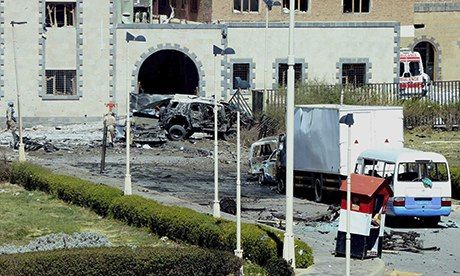Saudi militants behind Yemen car bombing
Updated: 13:15, Saturday December 7, 2013
Al-Qaeda claimed responsibility for the attack, saying it was retaliation for US drone strikes that have killed dozens of the terror network's leaders.
The attack - the deadliest in Sanaa since May 2012 - marked an escalation in the terror network's battle to undermine the US-allied government and destabilise the impoverished Arab nation despite the drone strikes and a series of US-backed military offensive against it.
US forces also have been training and arming Yemeni special forces, and exchanging intelligence with the central government.
Military investigators described a two-stage operation, saying heavily armed militants wearing army uniforms first blew up a car packed with 500 kilograms of explosives near an entrance gate, then split into groups that swept through a military hospital and a laboratory, shooting at soldiers, doctors, nurses, doctors and patients.
Officials earlier said 11 militants were killed, including the suicide bomber who drove the car. It was not clear if the 12th attacker was captured or escaped.
The investigative committee led by Yemen's Chief of Staff Gen. Ahmed al-Ashwal, said militants shot the guards outside the gates of the military hospital, allowing the suicide bomber to drive the car inside, but a gunfight forced him to detonate his explosives before reaching his target.
Read More Here
.....
Al-Qaida claims responsibility for Yemen car bomb attack
The attack on the defence ministry in Sana'a in which 52 people were killed is claimed by al-Qaida on Twitter

Al-Qaida said it
targeted the defense ministry because it 'accommodates drone control
rooms and US experts'. Photograph: YEMENI DEFENSE MINISTRY/HANDOUT/EPA
The two-stage operation came as the defence minister visited Washington for talks. The US military increased its regional alert status after the attack and is "fully prepared to support our Yemeni partners," a senior US defence official said.
At least 167 people were wounded, nine seriously, in the bombing and fierce firefight, which underscored the ability of insurgents to exploit Yemen's instability and tenuous security – even at the headquarters of its military.
Among the dead at the defence ministry complex, which also houses a military hospital, were soldiers and civilians, including seven foreigners – two aid workers from Germany, two doctors from Vietnam, two nurses from the Philippines and a nurse from India – according to Yemen's supreme security commission, which issued the casualty figures. Among the Yemeni civilians killed were a doctor and a senior judge, it said.
Al-Qaida in the Arabian Peninsula's media arm, al-Mallahem, claimed the attack early Friday morning on its Twitter account, saying it targeted the defence ministry building because it "accommodates drone control rooms and American experts". It said security headquarters used by the Americans in their war are "legitimate targets".
It was the deadliest attack in Sana'a since May 2012.
The US considers the Yemeni branch of al-Qaida to be the most active in the world. In recent months, Washington has sharply escalated drone attacks against the militants. US forces also have been training and arming Yemeni special forces, and exchanging intelligence with the central government.
The terrorist network gained a major foothold in the south, taking over several towns in the chaos that followed the 2011 uprising that ousted longtime president Ali Abdullah Saleh. The drone strikes and a series of US-backed military offensives helped uproot several key militant strongholds, but al-Qaida continues to fight back.
Read More Here
.....












No comments:
Post a Comment
Hello and thank you for visiting my blog. Please share your thoughts and leave a comment :)